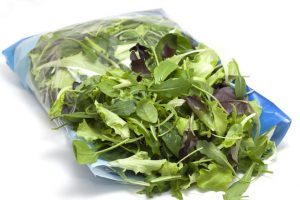If I’m eating pre-washed lettuce I just open the bag and throw it on the plate. Because there’s not much I can do, safety-wise, to it once it’s in my home. If there’s pathogenic E. coli, Listeria or Salmonella there (or others) I’m stuck with it.
Cindy Tran of the Daily Mail writes that Sydney, Australia nutritionist Susie Burrell recently talked about food safety risks on a local morning show including a recommendation to rewash prewashed leafy greens. 
She said people should always wash their store-bought salads, even if the packaging says ‘pre-washed’.
‘You must wash those ones out of the bags. It does say pre-washed but I would always wash it again because it has sat there for a long period, you don’t know what the turnover time is.’
I’m following recommendations from a bunch of my food safety friends who reviewed the literature on cut, bagged, washed, ready-to-eat leafy greens from a few years ago. In the abstract, they write:
The panel concluded that leafy green salad in sealed bags labeled “washed” or “ready-to-eat” that are produced in a facility inspected by a regulatory authority and operated under cGMPs, does not need additional washing at the time of use unless specifically directed on the label.
Leafy green food safety risks need to be addressed before they get to me, all I can do by washing it again is increase the chance I cross-contaminate the salad precursor in my home. My purchasing choice is based in trust that growers, packers and processors know what they are doing, and do it. But at best, they can only remove 90-99% of what is there with a wash.
And I can’t do any better.
